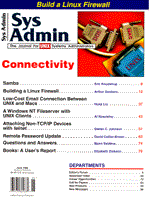
New Messages
Please send letters via email to saletter@rdpub.com. Writing to say how much I enjoy your articles and also ask a few questions and maybe offer a few suggestions. I'd like to see some articles on DCE and maybe some book reviews on it. Also would be great to see and article on UNIX System Administration Certification programs. What do you think?
Otis Murrell, System Administrator I'll probably leave the certification programs to Unix Review. I prefer to keep this magazine more concrete and task-oriented. I'll keep the DCE stuff in mind, though. --rlw From:Scott Merrilees Adam Moskowitz <adamm@menlo.com> wrote: A better way (the best way?) to do this is as follows:
# Save $1 from the command line cmd=$1 # Break the data into pieces set 'date '+%Y %m %d %H %M %S'' YY=$1 MM=$2 DD=$3 HH=$4 MN=$5 SS=$6
Better would be:
eval 'date '+YY=%Y MM=%m DD=%d HH=%H MN=%M SS=%S''
This is a general principle that can be used in many contexts, and can be used in sh, Perl, TCL to name a few languages. I often interactively write loops that generate commands, then, when I get them correct, pipe them into sh.
Scott Merrilees, Newcastle, Australia I love these exchanges. I think watching competent advocates explain and defend their design/implementation decisions puts "design" into context. What a teacher's dream come true! I would publish "bad" code every issue if I could be assured it would generate this kind of iterative discussion of alternatives. In all honesty, though, I'd like more explanation about why you like your method better. Write again. --rlw
Dear Robert Ward, I was really struck by your response. It speaks of a man who functions with a very high degree of honesty and integrity not to mention humility, virtues that are very hard to find in the professional world. I am a scientist who "has to do the dirty job" of sys admin and I thoroughly enjoy the articles in Sys Admin.
Keep up the good work, In truth, I find this letter harder to respond to than Moskowitz's. A letter (especially such an affirming letter) from someone who has no axe to grind, is always special. I'm a very quantitative person, and I know the renewal statistics on this magazine are very good. I interpret that to mean that our core readers are, like you, pleased with what they are getting. Thus, there is no reason for me to get defensive about the magazine's overall quality, direction, or goals. I also recognize, however, that it takes a special effort for someone to send us a letter -- an effort they wouldn't take if they didn't feel pretty strongly about something. If one person was affected enough to write an angry letter, there were probably 100s of others who were bothered to some lesser extent. Thus, I try to read all of our letters with the expectation that I'll find some useful feedback. That's not always true. Sometimes the writer just wants to let us know that we're not the magazine they wanted. (I remember someone who wrote to the C Users Journal complaining that we should explain what "this DOS thing was" if we wanted him to subscribe. Well, in truth, I guess I didn't want him to subscribe.) I think one of my key roles as editor is to recognize when feedback is germane to the magazine's mission and core reader and when it isn't. Mr. Moskowitz's comments about the code certainly were germane. So is your judgment that we're doing good work. Thanks. --rlw
To: saletter@rdpub.com Keep up the good work, every issue has something useful or interesting. I was very interested in the fvwm article; it really solved a problem area for me. I downloaded and installed the package shortly after reading Mr. Brownrigg's article. With all of the software available, it's impossible to investigate every piece of software that might solve a problem. Articles like this one serve a very useful purpose in highlighting important software.
Thanks again. Thank you, I appreciate your comments. --aa
|